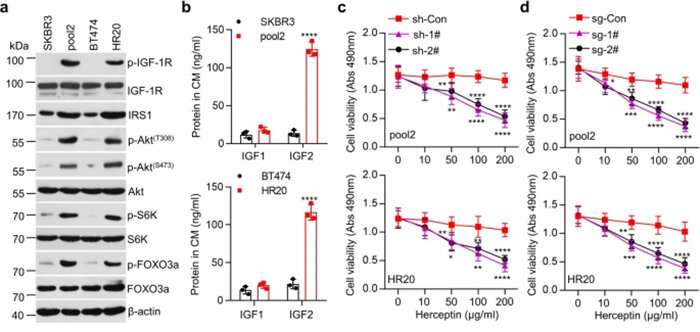
Research conducted by an international team of scientists discovered a mechanism that leads to Herceptin resistance, representing a significant clinical obstacle to successfully treating HER2-positive breast cancer. They also identified a new approach to potentially overcome it. The work is published online in Nature Communications.
“This work attempts to understand why some HER2-positive breast cancer patients do not benefit from treatment with Herceptin, which is a generally effective HER2-targeted therapy,” explains Bolin Liu, MD, Professor of Genetics at LSU Health New Orleans’ School of Medicine and Stanley S. Scott Cancer Center.
The researchers found increased signaling by IGF2/IRS1 (genes involved in regulating cell proliferation, growth, migration, differentiation and survival) in the HER2-positive breast cancer cells poorly responding to Herceptin. Further studies showed that disruption of a negative feedback loop formed by an important protein, FOXO3a, and several miRNAs that are controlled by FOXO3a causes abnormal activation of the IGF2/IRS1 signal, thereby leading to Herceptin resistance.
“Resistance to Herceptin frequently occurs and currently represents a major clinical challenge for successful treatment of HER2-positive breast cancer,” notes Dr. Liu. “Data presented in the study not only improve our understanding of the molecular mechanism through which IGF-1R signaling activation leads to Herceptin resistance, but also promote identification of precision therapies to reverse the resistance phenotype.”
The researchers write, “Breast cancer is the leading cause of cancer-related deaths in women worldwide. HER2-positive breast cancer is defined as a breast cancer subtype with amplified and/or overexpressed HER2 (or erbB2) gene. Amplification/overexpression of HER2 is observed in approximately 20-25% of breast cancers and is significantly associated with poor prognosis in breast cancer patients. Herceptin (or trastuzumab), a humanized anti-HER2 monoclonal antibody (Ab), is an effective HER2-targeted therapy against early and metastatic HER2-positive breast cancers. It has dramatically improved the survival of breast cancer patients with HER2-positive tumors, but not all HER2-positive breast cancers respond to Herceptin-based regimens. To date, we lack validated biomarkers predictive for Herceptin response.”
Source: Read Full Article
